In a Huge Victory for Abortion Rights in Minnesota, District Court Reaffirms State Constitutional Protections for Abortion and Permanently Blocks Numerous Restrictions
Ban on provision of abortion care by qualified advance-practice clinicians, twenty-four hour waiting period, requirement that young people notify both parents before obtaining abortion care, and many other restrictions blocked
07.11.22 – (PRESS RELEASE) Earlier today, a state district court permanently blocked several Minnesota abortion restrictions, including:
- a ban on qualified advance-practice clinicians providing abortion care;
- a requirement forcing patients to delay their abortion care by at least 24 hours after consulting with a healthcare provider;
- a requirement that young people notify both parents before they can receive abortion care;
- a requirement forcing abortion providers to give irrelevant and misleading information to their patients;
- a ban on the provision of second-trimester abortion care outside of hosptials; and
- regulations that subject abortion providers to felony criminal penalties for minor regulatory infractions.
The court held that the Minnesota Constitution protects not just a fundamental right to choose abortion, but also a fundamental right to access abortion care. The Honorable Thomas A Gilligan said: “The right to choose to have an abortion . . . would be meaningless without the right to access abortion care.”
Today’s ruling comes after both plaintiffs and defendants asked the court to grant summary judgment in the legal challenge, Doe v Minnesota. It also arrives a little over two weeks after the U.S. Supreme Court’s ruling in Dobbs v Jackson Women’s Health Organization plunged the nation into a public health crisis, underscoring the need for Minnesota to serve as a leader in abortion access as millions seek care.
Said Shayla Walker, Executive Director of Our Justice, a plaintiff in the legal challenge:
“Restrictions on abortion care not only make essential health care financially and logistically inaccessible, they also disproportionately impact people of color, people with low incomes, queer and trans people who reach out to our abortion assistance fund. In light of the Supreme Court overturning Roe v. Wade, every piece of red tape matters for Minnesotans and people traveling to Minnesota for abortion care. Today’s ruling is an important step toward making abortion accessible to everyone who needs it.”
Said Amanda Allen, Senior Counsel and Director at the Lawyering Project:
“With abortion bans in half the country set to take effect in the coming weeks and months, it is more important than ever to leverage protections in state constitutions like Minnesota’s. Minnesota has the chance to be a safe place for people amidst this national public health crisis. There is no room for laws that require patients and providers to jump through hoops to access care or that rob people of their dignity. Today’s ruling brings us one step closer to a Minnesota where everyone can get an abortion without the government getting in the way.”
Said Jess Braverman, Legal Director at Gender Justice:
“Three and a half years ago, Gender Justice and our clients understood that the fight to protect abortion rights rests in the states. Now, just weeks after the Supreme Court overturned Roe v. Wade, we are one step closer to removing harmful, outdated, and unconstitutional restrictions on abortion care here in Minnesota.”
Doe v Minnesota was filed in May 2019 in the Second Judicial District. Plaintiffs Our Justice and two health care providers argue Minnesota abortion restrictions—including a ban on qualified advanced-practice clinicians providing abortion care, a 24-hour mandatory delay and a requirement that young people notify both parents before they can receive abortion care, even if they are estranged— harm their patients and clients. They are represented by the Lawyering Project and Gender Justice.
###

